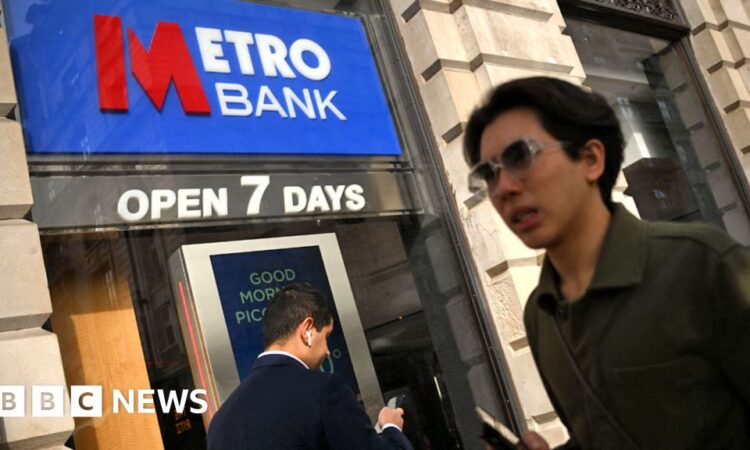
Metro Bank is to review whether it will stay open seven days a week, and plans to cut a fifth of its workforce.
This comes after shareholders backed a multi-million pound rescue deal aimed at securing the bank’s future.
The vote was on a package Metro Bank agreed last month to raise extra funds from investors and refinance debt. Metro’s share price had plunged in September following reports it needed to raise cash to shore up its finances.
What is Metro Bank?
Metro Bank was set up in 2010 as a “challenger” bank to bigger, more traditional lenders.
It was launched in the wake of the financial crisis and was the first High Street bank to open in the UK in more than 100 years.
Its founder, American businessman Vernon Hill, said at the time that he wanted to do things differently: so the bank offered customer-friendly perks like opening its doors seven days a week and even putting out water bowls and dog biscuits for customers’ pets.
Metro Bank currently has 76 branches across England and Wales, and in July said it planned to open 11 more across the north of England in 2024 and 2025.
What’s been going on?
The lender has faced a number of challenges in recent years after an accounting scandal in 2019, which led to some top executives, including Mr Hill, leaving the company.
Russ Mould, investment director at AJ Bell, said that since then the bank has been struggling “to get on a path to sustained profitability”.
More recently, it had asked City watchdogs for permission to use its own ratings system to value its mortgages and its assets. That would have freed up cash so it could go out and continue to grow its business.
But regulators turned down the request in September, saying that they wanted the bank to use an external rating system for now.
Metro Bank chair Vernon Hill, pictured with dog Duffy, founded the bank in 2010
Reports emerged in early October saying that Metro Bank was looking to raise money from investors, lenders and possibly considering selling some of its mortgages before refinancing some of its debts.
Although it has been successful in winning 2.7 million customers, analysts said that – like other banks – it might have struggled to make money over the past few years when interest rates were at historic lows.
Prior to that, the BBC understands Treasury officials had been in touch with the Prudential Regulation Authority, the financial services regulator, which is monitoring the situation at the bank.
What happened to its share price?
Metro Bank’s share price started to slide in September after the decision by the Bank of England not to allow the bank to use its own internal measures to work out the risks attached to its mortgages.
Then, after the reports that it was looking to raise money, its shares tumbled by as much as 30%, hitting lows of about 34p per share.
The shares have since recovered some ground, and are currently at about 41p per share.
However, the bank’s stock market value is now less than £100m, whereas it was valued at about £3.5bn at its peak five years ago.
Analysts have been on high alert for any problems in the banking sector following the collapse of US banks Silicon Valley Bank and Signature Bank in March this year.
Is my money safe?
Metro Bank is operating as normal and does not face any immediate threat.
Customer deposits up to £85,000 are protected by the Financial Services Compensation Scheme, which guarantees that if a bank runs into trouble, depositors will get their money back up to that level.
That guarantee would cover the vast bulk of Metro Bank’s £15.5bn in customer deposits.
The bank has confirmed it is looking at selling up to £3bn of its residential mortgages to other banks. However, homeowners don’t face any immediate change. Some customers might end up having their loans managed by another bank in the future.
Who owns Metro Bank?
Metro Bank is a publicly listed company on the London Stock Exchange.
This means that its shares are sold to the public who become part owners, or shareholders, in the business.
Metro Bank’s biggest shareholder is Spaldy Investments. It is an investment vehicle owned by Colombian billionaire investor Jaime Gilinski Bacal, who built one of the biggest banking empires in Latin America.
As part of the rescue deal, Spaldy Investments will sink £102m into the bank, increasing Mr Bacal’s stake from 9% to 53%.





